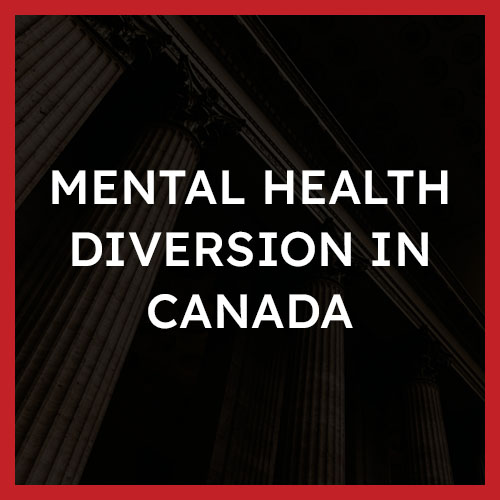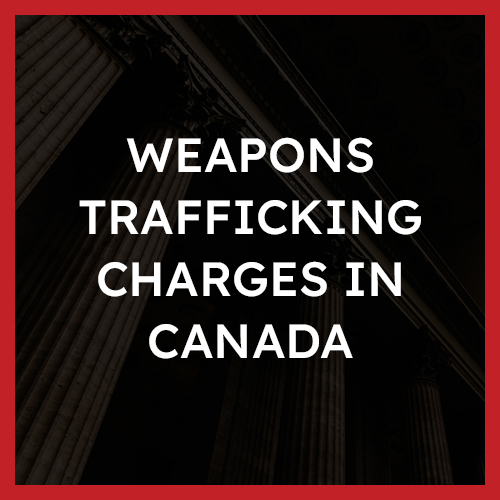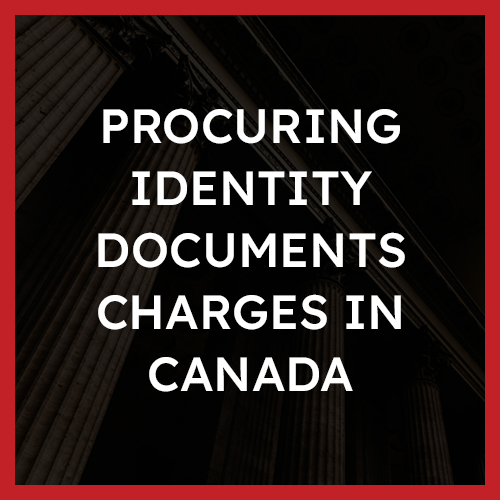Mental Health Diversion in Canada
What is Mental Health Diversion?
Disclaimer: Mental health diversion can vary significantly by province. For location specific information, please select the location nearest you and consult the mental health diversion page. Alternatively, contact one of our dedicated criminal defence lawyers in your area.
 In any given year, approximately 1 in 5 Canadians will experience a mental health problem or illness.
In any given year, approximately 1 in 5 Canadians will experience a mental health problem or illness.
For individuals with mental health issues who are accused of a committing a criminal offence, Mental Health Diversion can be a great way to deal with a criminal charge without ending up with a criminal record and can also be beneficial personally and professionally.
The Mental Health Diversion Program recognizes that certain instances of offending behaviour are caused by untreated or poorly treated mental health issues, combined with inadequate and often inaccessible treatment available to the average person.
Often when these issues are addressed, offending behaviour is reduced or eliminated. In these circumstances, it is far more beneficial to deal with the underlying cause of the offending behaviour, as opposed to simply punishing the offender.
The Mental Health Diversion program is a positive initiative in Canada that helps address increasing criminalization of persons with mental illnesses. The overall goal of the program is to focus on rehabilitation, rather than punishment.
That said, having a mental health concern does not automatically mean you will be eligible for the program.
Who is Eligible for Mental Health Diversion?
The diversion program is available for individuals charged with less serious offences where there is a reasonable belief that a person is suffering from a mental health disorder.
Examples of low-risk offences include:
- Theft;
- Fraud;
- Mischief;
- Assault;
- Obstruction; and
- Public intoxication.
However, because eligibility for mental health diversion is determined on a case-by-case basis, it is possible that in some unique circumstances, an offender will be found eligible for the program even when they have been charged with more serious offences like break and enter, assault of a police officer, or even various forms of domestic violence can be referred to the program.
That said, eligibility for MHD will always be denied for the most serious offences like murder, manslaughter, or criminal negligence causing death.
Further, anyone charged with domestic assault will be precluded from admission to the program, no matter how minor the assault was. Admission to the program can also be denied if it is found that there were aggravating factors present when the offence was committed. Aggravating factors that may bar admission to MHD include things like the use of firearms in the commission of the offence, significant planning and deliberation or sophistication in the execution of the offence, significant and adverse effects or losses suffered by the victim, or the use of persons under the age of 18 in the commission of the offence.
The personal circumstances of the offender will also have a significant bearing on whether an accused will be found to be eligible for mental health diversion. Specifically, things such as an offender’s mental health history and past criminal record will be considered when deciding whether the offender should be admitted to the program. If an individual’s personal history suggests that they are a very high risk for re-offending or they have a history of failed diversion and failed treatments, it is unlikely that they will be accepted to the program. For an offender to be accepted into mental health diversion, they generally need to be able to show that they have the motivation to change their lifestyle, a willingness to accept responsibility for the offence, and a willingness to complete the program and any treatments that have been designed for them.
Types of Mental Health Exceptionalities Accepted into the Program
Accused persons accepted into the program most commonly suffer from:
- Psychotic disorders (i.e. schizophrenia);
- Mood disorders (i.e. bipolar, depression);
- Adjustment disorders; and
- Anxiety disorders.
Often, a client’s mental illness is made worse by a drug or alcohol addiction. If found eligible for diversion, the individual will receive community-based treatment that focuses on the specific mental health issue, life skill challenges, and substance abuse disorders that may have contributed to the offence.
How can I get mental health diversion?
To be diverted to MHD, you will need to demonstrate that you are eligible for the program on the basis of the nature of your offence, your personal circumstances, and your potential to be effectively treated within the community. Importantly, you will have to show that diversion is conducive to your personal safety as well as the safety of the community.
If the Crown consents to your charges being diverted through MHD, you will then meet with a mental health worker who will perform a further assessment and confirm that you are an appropriate fit for the program. Once accepted, you will have to accept responsibility for the offence and voluntarily participate in the program by complying with treatments that are prescribed to you, and by completing activities mandated by your mental health worker. If the Crown consents to your participation in the program, at your next court date we can appear on your behalf and notify the court that your charges are currently being resolved through mental health diversion. We will then set a return date several months down the line to allow you time to complete the program.
What happens after you get mental health diversion?
If you have successfully completed the program by the return date, the Crown will withdraw the charges against you. Once the charges are withdrawn, your involvement with the authorities for this offence will completely end. It is important to note that you will not receive a criminal conviction if you were diverted through MHD. While you must accept responsibility for the offence, it is important to note that mental health diversion is not the same as an admission of guilt, nor is it a finding of guilt. As such, you will not be convicted of the offence and it will not show up on basic criminal record checks. However, note that mental health diversion can show up on some enhanced criminal record checks like police information checks or vulnerable sectors checks for the period of one year.
By contrast, if you fail to complete the program, on the return date the Crown will reinstate the charges against you and continue to pursue your conviction.
How Our Team Can Help with Mental Health Diversion
A mental health disorder is a substantial disorder of thought, mood, perception, orientation, or memory.
Our role as criminal defence lawyers is to convince the Crown that our client suffers from a mental illness and would benefit from treatment instead of being prosecuted and convicted. Once the Crown gives his or her consent, healthcare workers complete an evaluation.
If an accused person meets the criteria for the program, we can go to court for our client and ask for a three-month adjournment while they receive treatment.
After those three months, if treatment has been completed, we will again attend court and ask that the charges be withdrawn.
What’s Next?
It is our job as criminal defence lawyers to pursue any and all defences available. If you have been charged with a criminal offence and think you may be eligible for the mental health diversion program, please contact us.
Barring unforeseen circumstances, if you retain us, are eligible, and successfully complete the mental health diversion program, your charges will be withdrawn.
About The Author
Ask A Question
We endeavor to respond to questions within 24 hours. If your matter is urgent, please call our office or submit a request for a free consultation.








